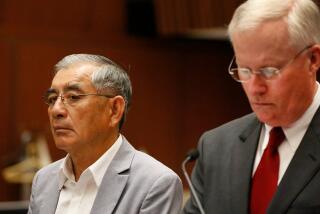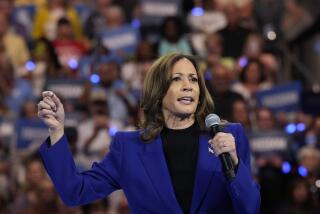DNC Donors Repaid, Senate Memo Says
- Share via
WASHINGTON — Senate investigators probing campaign finance abuses have found that two Maryland women funneled $25,000 to the Democratic Party in 1996 at the behest of the Macao-based business partner of controversial fund-raiser Yah Lin “Charlie” Trie and were subsequently reimbursed, according to an internal Senate memorandum.
Federal election law prohibits reimbursement of campaign contributions and requires disclosure of the actual source of the funds.
The women are the spouse and cousin of an employee of a Macao trading company controlled by Trie--a former Little Rock, Ark., restaurateur and friend of President Clinton--and his partner. The women contributed three checks totaling $25,000 to the Democratic National Committee in connection with a Feb. 19, 1996, fund-raiser at Washington’s Hay-Adams Hotel.
The dinner, which featured Clinton, brought in $1.1 million and was the first event organized by John Huang, the former Democratic fund-raiser who now is at the center of various campaign finance investigations.
Senate investigators determined that Ng Lap Seng, Trie’s partner in the San Kin Yip trading company, asked the two relatives of his employee, Ming Chen, to donate the money in their names so he could attend the dinner and meet Clinton. Ng is not permitted to contribute because he is not a legal U.S. resident.
Chen’s wife, Yue F. Chu, and his cousin, Xi Ping Wang, who made the donations on Ng’s behalf, live in Gaithersburg, Md., the Senate memo said.
The two-page memorandum to Sen. Fred Thompson (R-Tenn.), chairman of the Senate Governmental Affairs Committee, marked the second time in 10 days that allegations have surfaced that the true source of money donated for the Hay-Adams dinner was not properly disclosed.
The Trie-related contributions also shed additional light on what the Senate memo calls “the low-level participants in the scheme” to whom Thompson has sought to grant partial legal immunity in exchange for their testimony. The June 9 document was written by Michael J. Madigan, the committee’s chief counsel, to make the case for offering Chu and Wang immunity, which would have precluded their Senate testimony from being used against them in any possible criminal prosecution.
Committee Democrats last week balked at providing immunity to Chu, Wang and 16 other donors. Since Chu spoke twice to a congressional investigator, both she and Wang have declined the committee’s invitation to conduct an informal interview or testify without immunity. Natives of China, Chu and Wang--who are next-door neighbors--have received scant media attention.
Attorney Samuel Rosenthal, who is representing both women, declined to comment Wednesday on the Senate document or the contributions.
Trie, a native of Taiwan who first met Clinton while running a Chinese restaurant near the Arkansas state Capitol when Clinton was governor, is believed to be in Asia. He has asserted his right under the 5th Amendment not to testify in the inquiry. His attorney could not be reached for comment.
The DNC has announced that it will return Chu and Wang’s $25,000 in contributions because its auditors were unable to obtain sufficient information about the donors. Trie was credited with soliciting these donations for the Hay-Adams event and Huang with bringing them in.
According to Madigan’s account, during a 1996 Chinese New Year’s celebration at Chu’s house, the women “were solicited to front money for Ng Lap Seng. . . [He] asked if Chu and Wang would donate money in their names if he would reimburse them. Chu stated that she decided to participate in the scheme as a favor to her husband’s boss.”
Chu ultimately provided four checks totalling $23,000 to Keshi Zhan, a friend of Trie’s and a Democratic donor for whom the Senate committee also proposed immunity. The payee line on the checks was left blank. Federal election records show that $20,000 of that total went to the DNC, $2,000 was donated to the Democratic Senatorial Campaign Committee, and $1,000 went to House Minority Leader Richard A. Gephardt of Missouri. Wang also gave a check for $5,000 to Zhan with the payee line left blank. The money went to the DNC and she was reimbursed by Ng or one of his companies, the memo said.
While the DSCC contribution has not been returned, DSCC spokeswoman Dana Lewis said: “Yue Chu is definitely someone we are looking at.”
Paul Johnson, the DSCC’s executive director, said the committee was waiting to see what additional information emerges through investigations and the media before deciding whether to refund the controversial contributions.
Erik Smith, a Gephardt spokesman, said the $1,000 donation to the lawmaker was given back to Chu in March because it was not permissible.
More to Read
Get the L.A. Times Politics newsletter
Deeply reported insights into legislation, politics and policy from Sacramento, Washington and beyond. In your inbox twice per week.
You may occasionally receive promotional content from the Los Angeles Times.








